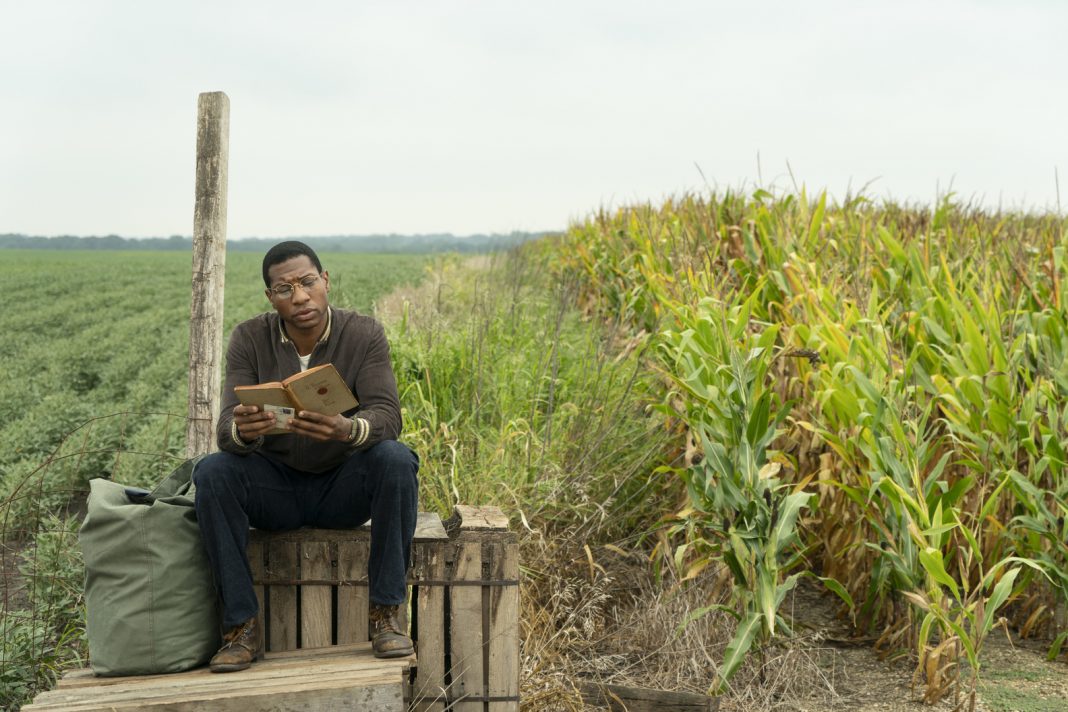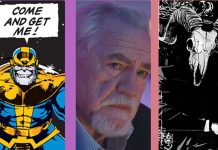With the premiere of Lovecraft Country tonight, Jonathan Majors (The Last Black Man in San Francisco) should be prepared for his continued rise to stardom. Playing Korean War Veteran Atticus “Tic” Freeman, Majors leads Lovecraft Country’s incredible cast where every performance is uniquely dynamic. Majors’ nuanced performance of Tic shows the complexities of this brilliant, wise, and emotional man of mystery. While he doesn’t share all of his secrets, Tic is happy to share his quest to find his father and learn more about his dead mother’s lineage with his trusted circle of family & friends.
Ahead of the premiere, The Beat spoke to Majors about black masculinity, the most pivotal moments for this season, and so much more!
On reshaping black masculinity in Lovecraft Country and especially through his character Tic, Majors told us:
“Tic contains so many multitudes. He is a man of intellect, of heart and of his body, so, he works and moves through this 10- hour canvas with that. And because of the world, he’s been put into, he’s also a son, a lover, a soldier, an adventurer, in addition to being a Black male.”
“Not even on purpose, I was in conversation with someone and I realized that my last three characters- Montgomery in The Last Black Man in San Francisco, David in Da 5 Bloods, and Tic in Lovecraft Country, is battling the same war but different missions. In some ways, these characters serve as conversation starters about the limitations society puts on us, those we put on ourselves and changes that need be made in regards to Black masculinity, and I hope these depictions can help be corrective.”
On the most pivotal moment for Tic on this journey when he pushes past fear and becomes the man he was always meant to be, Majors shared:
“Wow, I don’t think we’ve gotten there yet. The beautiful thing I enjoyed about playing Atticus was that he was discovering new things every single day. He doesn’t know what the search for his father will bring, but he’s willing to discover it. And the interesting thing is that fear does not bother him. He feels it but it doesn’t fuck with him, he can move through it.”
“Atticus has so much emotion and hurt inside of him. When he gets to a place where the hurt is right in his face, that is a different type of fear for him. That is man vs. self. Ultimately, I think that’s what Atticus’s journey is about, Atticus vs. Atticus and dealing with his own shit. In those moments where he allows his heart to break, that’s where he begins the rotation to the man that he’s going to be. He does that periodically throughout the ten episodes and even at the end of this story, there’s still more he can learn.”
On how the inheritance of ancestral traumas and curses play out for Tic, Majors said:
“Legacy is what comes up for me. When we think of legacy, we think about the tribes of Africa, the Obamas, but legacy is everything. Legacy is slavery, it’s not just the good stuff. With respect to Atticus Freeman, he is wrestling with the dichotomy of being half slave and half free man. The Freemans were never slaves, but his mother’s side was.”
“As an African-American, the most uncomfortable thing we have to wrestle with is being the descendant of those who enslaved us. You can’t deny that you are that as well. So, we take all of that trauma and decide what to do with it- that is the story of our characters, deciding how to mitigate it and/or live with it. What we see with the Freeman family, in particular, is what legacy will they push forward. Atticus begins to collect things to put in his legacy and give to his family, the ones that already living and his progeny. Each episode is how he continues his legacy, corrects things, and makes things better.”
On how Tic’s relationship with the supernatural evolves and comes to ground him this season, Majors told us:
“When I think of mortal peril, I think of children. I think of my daughter and young cousin who believe in monsters under the bed. They believe in all of these magical things and yet they are extremely grounded. That speaks to the purity of our characters, which is one reason I think people can connect to the Freeman’s, the Lewis’s, the Baptiste’s, and even the Braithwhite’s. They have lived lives that have somehow encapsulated themselves in a way that they truly believe in the supernatural as if it is a religion in a way, the same way folks believe in the Holy Ghost. So, the supernatural elements are a part of them, not outside of them.”
“While it is a struggle for Atticus to see all of these monsters in the flesh, he’s been seeing them in his brain. He dreams about these things, and so is it a recurring dream, or is he just remembering? When Tic talks to his Uncle George about the book Dracula, that’s their lexicon, their way of speaking to each other. And it’s not a metaphor, it’s their language to let the other know they need to get busy!”
On what was most alluring about joining Lovecraft Country, Majors shared:
“It was Atticus. The way he was described in the script as a Korean war veteran, which is important because the Korean War is quite different than the other American wars. He’s also a Black Man who is traveling and a bibliophile. It’s not something I’ve seen before. And he’s fishing for his father, and that was something that I could understand.”
“And so that in and of itself was enough for me. I entered into the project because it’s a family drama. We’re going to deal with Dad, Unc, Leti, and all of these things. And as I began to read more scripts, the story became more and more complex, unreal and fantastical. All of these elements made it so real, what I call dog shit reality and that’s what I am into. So, not only was the challenge of it great, but the ambition was full and I was interested in giving it a go.”
Watch the premiere of Lovecraft Country tonight on HBO, 9pm EST!








Currently reading the novel, and it’s great so far.
Comments are closed.